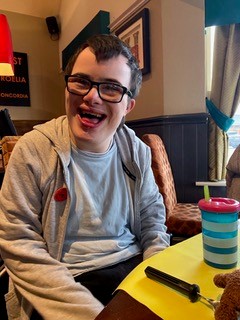My son has a right for his voice to be heard
For 24 years, Lilias has been fighting for her son, Fearghas. She had never heard the term ‘deafblind’ before he was born and learned as much as she could.

Her work has influenced people all around the world in advocating for the rights of disabled people like Fearghas.
Would life be different?
When Fearghas was born, getting access to information was extremely difficult. The first time I saw him, I knew something wasn’t quite right, but no one would tell me anything. It took three paediatricians to tell us that he might have Down syndrome. Even then, they couldn’t confirm it straight away.
It took us three years to see an ophthalmologist about his eyes because of repeated hospitalisations. When we finally did get the appointment, we were told that he was definitely short-sighted but they wouldn’t prescribe him glasses. “They’d be more trouble than they’re worth,” she said.
Now, I would argue very strongly that, had that been a child that didn’t have disabilities, there would’ve been no question about prescribing glasses having identified this child as short-sighted. So I argued, and I was not going to leave that room without a prescription.
From the first moment the glasses being put on Fearghas’s face, he just stilled and looked. Then he moved his head and he looked. It was just magical, and he never once threw them off. They worked for him and he knew they worked but, if I hadn’t argued, he would not have been given glasses at that stage.
Every stage of Fearghas’s life has required me to learn as much as I can. I often wonder how different our lives would be if I knew then what I know now.
Knowledge is power
People ask me what the most important thing is for Fearghas’s wellbeing but, the honest answer is everything is important. If he is in good health, then he can enjoy all the things that he loves to do. He is in a better place to make new friends and try new things. If he is poorly and no one is listening to him, then all things he loves are closed off.
He needs to be treated as a whole person, where everybody supporting his needs knows what is being done by everybody else. The appropriate adjustments need to be made so that access to healthcare is as easy as possible for him. But, most importantly, we need to be taken seriously. Everybody needs to understand that somebody like Fearghas needs more support than a lot of other people.
Over the years, we have had so many incidences that could have been avoided if people understood Fearghas a little better. His ophthalmologist appointments were always challenging as they would make him wait in a busy, crowded room. It was only recently when a new consultant came into our life, that he gave permission for us not to have to go through the different hoops and to go straight to his room. He also started doing examinations under general anaesthetic, as well. But, by that time, Fearghas had detached retinas in both eyes.
There is a lack of understanding of how people like Fergus use their tactile senses, their mapping skills and their memory to communicate and experience the world. And that lack of knowledge means that they’re not able to support Fearghas in the optimum fashion for his needs and, therefore, he doesn’t make the progress that he could be making because doors are closed to him. He’s a deafblind person being supported in a seeing and hearing world as opposed to a tactile world.
You’re the people who matter
As a parent, all I want is for him to live as happy, stimulating, fulfilling and exciting a life as is possible. For that to happen, there needs to be a greater understanding about what means the most for disabled people and their families.
Sense’s survey is there to shed some light on the real issues experienced by people with disabilities and their families. Know where the problems lie helps us all understand what needs to be worked on.
To everyone reading this, you’re the people who matter. Your lived experience really matters, and people need to know about it. If they don’t know about it, then people don’t know that things need to change. And things really do need to change.

